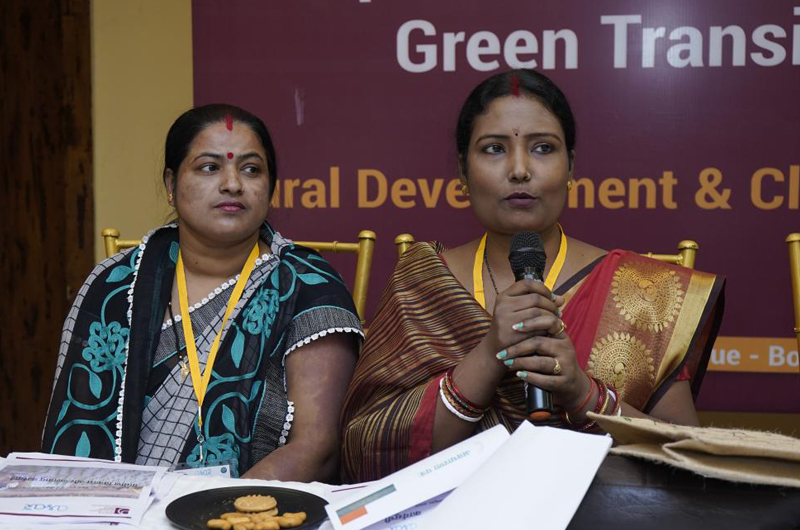Navigating gender dynamics in grassroots governance for climate resilience is a subject that has not been discussed much. At the grassroots level, ‘inclusion’ goes beyond representation. It involves ensuring diverse voices, including those of women, are actively made a part of the decision-making processes, Bhargabi Ghosh and Eshita Trivedi point out, and explain the challenges in this article
At the grassroots level, ‘inclusion’ goes beyond representation. It involves ensuring diverse voices, including those of women, are actively part of the decision-making processes. This is especially crucial while addressing issues like climate change, given the phenomenon’s unequal gendered effects. Though progress has been made in the area of representation in the decision-making processes, conventional power dynamics frequently result in their voices being marginalised and ignored. This results in a large gap between the desired inclusion and the actual implementation in practice.
PDAG’s Conference of Panchayat: Ensuring inclusion
Policy and Development and Advisory Group (PDAG) and Asar launched The Conference of Panchayats (CoP), a state-level multi-stakeholder dialogue session, convened from 2022 to 2024. The aim was to accelerate proactive measures, build consensus on climate impacts, and devise action plans at local and regional levels. It brought together stakeholders, including elected representatives of panchayats, governmental bodies, non-governmental organisations, and academia, to collaborate on formulating a bottom-up strategy at the block and panchayat levels.
It facilitated grassroots discussions on coping mechanisms for climate change and overcoming obstacles to just transitions in areas affected by coal mining. Through these endeavours, CoP envisioned comprehensive strategies to bolster climate resilience. Over 250 panchayat leaders from 12 districts have been reached by PDAG and ASAR through the initiative, with a noteworthy representation of female leaders surpassing 60 per cent. Women actively participated in the conferences, bringing up a number of issues that needed to be improved in order to guarantee their inclusion in other domains, including governance. Among the noteworthy issues brought up were:
Misallocation of DMFT funds: The initial intent behind the allocation of DMFT (District Mineral Foundation Trust) funds was to enhance livelihood opportunities for women, Adivasi communities, and other vulnerable groups, aiming to empower regions affected by mining activities. However, instead of being utilised in alignment with their intended purpose, the funds are predominantly redirected towards infrastructure projects. The diversion impedes the advancement of women’s skill development and the socioeconomic empowerment of affected communities.
Gender disparities in climate resilience: In regions impacted by climate change, gender dynamics reveal a notable disparity: women disproportionately bear the burden of adapting to and mitigating its effects, while men often migrate in search of better opportunities. Women are faced with a triple burden: managing household responsibilities, earning a livelihood, and addressing the challenges posed by climate change. Therefore, it’s imperative to adopt gender-sensitive approaches that empower women to participate in inclusive decision-making processes and implement effective mitigation strategies.
Our team also noted instances during CoP where women were accompanied by their husbands, with the husbands assuming the role of primary advocates for the women. While this dynamic may not have been explicitly evident during the conference, it is a common occurrence in field and grassroots governance. Despite women being elected as representatives, it is often men who wield the decision-making power.
Representation versus inclusion
Just 11.8 per cent of the 542 members of the Lok Sabha and 11 per cent of the 245 members of the Rajya Sabha in India are female. Only 9 per cent of the 4118 members of the legislative assembly are women, according to the 2018 economic survey. However, more than a million women have been elected to serve as representatives in the three-tier Panchayati Raj Institution (PRI) of local governance.
Many states have increased the quota for women representatives in PRIs to 50 per cent. The reservation policy was designed to reduce historical gender disparities in decision-making and to act as a catalyst for women’s empowerment. Although there are undoubtedly more women in PRIs now than there were a few years ago, this hasn’t always translated into meaningful autonomy or influence for them. Reservations alone do not ensure meaningful inclusion.
The reality on the ground often tells a different story, with women’s voices suppressed and their roles reduced to serving as a proxy for their husbands. Women elected owing to the reserved seats are merely figureheads, with men making decisions on their behalf. Despite being elected, these women have minimal involvement in governance, serving as symbolic representatives due to reservation policies. Based on the cultural norms and deeply ingrained power relations, it is believed that in matters of governance, women should submit to men. This feeds into a never-ending cycle of marginalisation where men continue to exercise power behind the scenes.
Way forward
Elevating women’s voices is not just a call for representation but a demand for real inclusion in shaping a resilient and equitable future. Moving forward, addressing the challenges of gender dynamics in decision-making and climate resilience requires a multifaceted approach. This can utilise a comprehensive capacity-building programme targeting women in leadership roles, equipping them with the necessary skills to actively participate in governance. Heightening awareness within communities about the significance of women’s contributions and involvement in decision-making processes is equally imperative. Support systems, both within PRIs and at the grassroots level, should be established to empower women leaders and facilitate their effective engagement. Additionally, fostering community engagement initiatives can enhance the inclusivity of women in governance processes.
These recommendations underscore the importance of recommitting to the pursuit of gender equality in governance, ensuring that women’s voices are not merely heard but actively listened to and respected. Such measures would aim to address the existing gaps, bolster the impact of reservation policies, and promote substantive empowerment of women.
(Courtesy: India Water Portal/ indiawaterportal.org. Bhargabi Ghosh is senior consultant, Strategic Communications and Public Policy Advisory, Policy and Development Advisory Group, and Eshita Trivedi is assistant, Strategic Communications, Policy and Development Advisory Group.)



 from Webdoux
from Webdoux